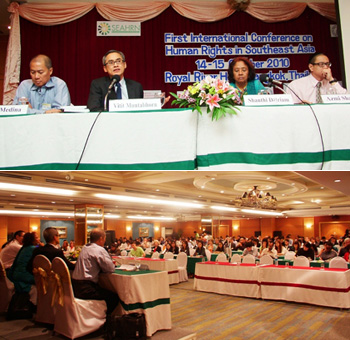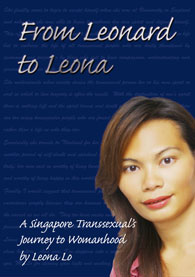Dear Readers,
In October, so many LGBTI related issues cropped up that I do not know which to write on. Also, I attended the First International Conference on Human Rights in Southeast Asia in Bangkok, organised under the auspices of Mahidol University, and spoke on Corporate Social Responsibility.
As news and activities, they take the following order:
1. the porn-making by cyber-bullies in Anglo Chinese Junior College incident;
2. the First International Conference on Human Rights in Southeast Asia; and
3. the Universal Periodic Review submitted by civil society groups to the United Nations Human Rights Council.

Since October is just over – the month which the Singaporean Parliament decided that s377A, that sex between men should be “sandwiched” between necrophilia and bestiality as a criminal activity in the Penal Code, in 2007– I shall take my cue from it. Writing about the conference would also bring in some regional perspective, which this column is supposed to have. Therefore, I will not be answering any letters this week.
The First International Conference on Human Rights in Southeast Asia
Organised by the newly-formed Southeast Asian Human Rights Studies Network (SEAHRN) and coordinated by Mahidol University, the conference was a resounding success. It attracted more than 350 participants instead of the estimated 150.
Ambassador Surin Pitsuwan of Thailand, the current Secretary-General of ASEAN, gave the opening speech. Given that the Human Rights Programme at the Faculty of Law at Mahidol was started by Ms Sriprapha, the Thai government’s appointee to the ASEAN Intergovernmental Commission on Human Rights, the amount of blessings the conference has is obvious.

Photo from http://www.seahrn.org
The importance of LGBTI rights in international human rights
Reflecting the importance of LGBTI rights, one of the two plenary sessions of the two day conference was on “Sexuality and Human Rights” (the first one covered, among other areas, the ASEAN Charter and Human Rights). It also mirrored the importance of Equal Rights for LGBTI in regional and international human rights.
The plenary on “Sexuality and Human Rights” was chaired by Prof. Douglas Sanders, with speakers from several ASEAN countries, except the host country, Thailand.
The international delegates from outside the region were shocked by what happened in Surabaya in March this year. I revisited the terror when King Oey, from Indonesia, described how Islamic extremists stormed the hotel where the regional conference of ILGA was held.
Danton Remoto of the Philippines was the coolest. I cheered when he informed us that more than 20 lawyers, academics and law students helped them in challenging the decision of the Filipino Electoral Commission which refused Ang Ladlad, an LGBTI political party, rights to stand in the general elections. The Supreme Court proclaimed the action of the Commission unconstitutional. The Commissioners who refused Ang Ladlad’s candidacy and called him “an abomination of nature” had to eat their words.
Ang Ladlad never thought it would win. The constitutional challenge was to establish their rights – the right to lose an election, if they choose to!
I could not stop laughing at Ang Ladad’s election campaign: The lesbians pole-danced. The transgender held beauty pageants. Other parties tried to co-opt them. But they were careful. Many merely wanted the media attention they created. In Danton’s own words, “We did not need to seek the media. All we did was to put on a pink T-shirt and the media came to us. It cost us only a coffee at Starbucks.” They reclaimed everything. It was “Larry Kramer meets Martin Luther King”.
Transgenders’ plight in Malaysia
Khartini Slamah of Malaysia touched us with the plight of transsexuals, and with her anger.
My heart ached when she recounted that she was a sex worker, and had been arrested and raped by police in Malaysia. She gave sexual favours to secure her release from detention. To add insult to injury, she was told by some officials that it could not be rape because her vagina was not “original”.
Her anger was real. Her pain, even more.
Sitting on stage, I could not see her slide presentation as she mentioned that compared with other transgender persons, she has less problems travelling because she speaks English. It later transpired that her passport still states that she is “male”. The same goes for her Thai counterparts. Imagine their difficulties if they cannot adequately explain it to the immigration officer each time they enter a country.
Corporate social responsibilities
I was invited to speak on Corporate Social Responsibility (CSR), an interest developed more than two years ago, when invited by Community Business in 2008 to attend its conference on Diversity at the Workplace in Hong Kong. It continued into the “Out & Equal” conference last year at Disneyland, Florida.
My forays into this area still did not equip me with the necessary knowledge to speak at a plenary of an academic conference. I need to thank Prof. Douglas Sanders who wrote an excellent background paper on the legal aspects of equality in employment for LGBTI internationally and the region; Ted Tan of Think Centre, who gave me the links on CSR; and my research assistant, Roderick, who worked overtime doing all the background work, feeding me facts and figures and editing my work. Finally, I need to thank myself for not sleeping for two nights on arrival in Bangkok, to sound credible.
On the second day of the conference, Panda George presented on the languages corporations speak, what are their interests, and how to make a “business case” for corporations to adopt CSR. According to Hong Kong-based organisation Community Business, studies have found that LGBTIs who are not out at their workplaces report lying about their personal lives, hindering trust and cohesion with colleagues and superiors. Also, concealing their sexuality at work would reduce their productivity by up to 30 per cent.
However, at the back of my mind, I was thinking of intelligent Khartini, who obviously became a sex worker because she was not able to find employment.
A true story about “Alia” I plucked from Pang Khee Teik’s article on 9 September, “For M’sian gays, hope for a better tomorrow”, in Malaysiakini, which I had intended to use for my presentation, comes to mind:
“Since nobody would give her a job, she was hungry all the time and had to sell her body to survive. When she was 17, she found she was infected with HIV.”
If only corporations could recognise them as human beings like everyone else, she would probably have had a better outcome. Each transgender a corporation employs could mean creating a better future for another human being.
How special are you?
That afternoon, I chaired a panel in one of the parallel sessions. There were three speakers who presented papers on the usual academic discourse in the area of queer studies.
At the end of the session, one transwoman came up to me to introduce her organisation, the Thai Trangender Alliance. Her name is Jet. She confirmed that transgenders in Thailand do not get their identity documents changed. They apply for jobs and travel around the world with passports of the sex which they do not identify with.
How vulnerable are they to being exploited? How open are they to uncalled for insults? How limited could their world be? Their full potential are hampered by a piece of paper each time they look for a new job, a promotion prospect comes up, or just to go see the Statue of Liberty.
As she skipped away to join her friend, evidently joyous with her personal triumph of “coming out” to one more stranger and in a foreign language, I could not help smiling. My heart filled with pride for this young person, who could not have been older than 21.
She came from Pattaya with Khartini, where a sex worker and HIV conference was taking place.
Amidst the academic pretentiousness of the room, she was special.
Her road ahead is long, in this land of heartless smiles. A land which does not recognise her right to smile the way she wants to smile.

Now writing this column, my mind switched to Leona Lo, a Singaporean transgender woman. Jet knows her, too.
How brave are Leona and her fellow transgender activists to come-out? They, who have their papers changed to match their chosen identity, could slip into nothingness. They, who could blend with the common, have no need to speak up.
How special they are, to stand up and be counted.
Hope lies eternal when you meet someone like Jet. All of us who have the ability to be special, should create the “new normal”.
Until the next time, please ask yourself, ‘how “special” can you be’ and be brave.
Bon Courage!
The Lawyer Is In is a monthly column. In the columns, George Hwang will answer questions posed by readers on subjects such as personal and civil rights, workplace issues, discrimination, immigration, sexuality, lasting power of attorney and estate planning. To submit a question, email editor@fridae.com. Responses will be made by placing your question (without identifying you) in an upcoming column, and answering it there. We regret that questions cannot be answered privately.











 打印版本
打印版本


















读者回应
There is currently no legal recognition for same sex marriage and this is presumably because 377a is still in the books. However, 377a only applies to gay and bi men; lesbians and bi women are unaffected by it.
What justification is there, legal or otherwise, should two women who want to be married to each other be denied the right should they wish to register their marriage with ROM? We know that if such an event does materialize, the couple is likely to be met with resistance from ROM. In that case, what legal recourse do they have?
OMG, I actually agree with percole alex today! But he's got to get the conversation out of the gutter and back on track with the powers to be that actually can do something
I think that 377A will only whither away with love and marriage and happiness, not skanky ill defined legal causes for blow jobs in parks and toilets
love will rule out in the end and everyone loves a nice wedding and happy couples, happy married monogamous gay couples are the new rockstars
The Women's Charter disallows same-sex marriages.
Avoidance of marriages between persons of same sex
12. —(1) A marriage solemnized in Singapore or elsewhere between persons who, at the date of the marriage, are not respectively male and female shall be void.
[30/96]
(2) It is hereby declared that, subject to sections 5, 9, 10, 11 and 22, a marriage solemnized in Singapore or elsewhere between a person who has undergone a sex re-assignment procedure and any person of the opposite sex is and shall be deemed always to have been a valid marriage.
请先登入再使用此功能。